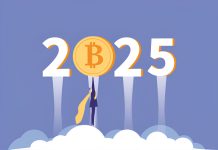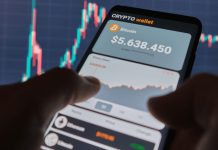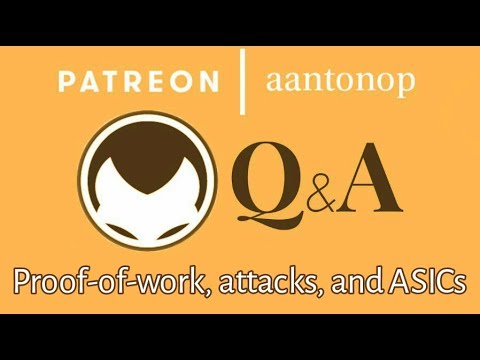How does proof-of-work prevent 51% attacks? Can the attacker change the whole chain in a 51% attack? How often has a 51% attack occurred? Could a government agency reverse a transaction? Did Satoshi foresee ASICs and how competitive mining would be? Does China control Bitcoin mining? Should we change the proof-of-work to solve this?
These questions are from the second, third, and fourth sessions of MOOC 11, which took place on February 7th, February 14th, and February 22nd 2019 respectively. If you want early-access to talks and a chance to participate in the monthly live Q&As with Andreas, become a patron: https://www.patreon.com/aantonop
RELATED:
Consensus Algorithms, Blockchain Technology, and Bitcoin – https://youtu.be/fw3WkySh_Ho
Advanced Bitcoin Scripting Part 1: Transactions and Multisig – https://youtu.be/8FeAXjkmDcQ
Advanced Bitcoin Scripting Part 2: SegWit, Consensus, and Trustware – https://youtu.be/pQbeBduVQ4I
What is Consensus: Rules without Rulers – https://youtu.be/2tqo7PX5Pyc
Forkology: A Study of Forks for Newbies – https://youtu.be/rpeceXY1QBM
Bitcoin: Where the Laws of Mathematics Prevail – https://youtu.be/HaJ1hvon0E0
Software distribution security – https://youtu.be/_V0vqy046YM
What is mining? – https://youtu.be/t4p4iMqmxbQ
The mining process – https://youtu.be/L4Xtau0YMJw
Nonces, mining, and quantum computing – https://youtu.be/d4xXJh677J0
Iterating nonces and the block reward – https://youtu.be/tjn2aoMaFlY
Miners, pools, and consensus – https://youtu.be/JHz7LM4ncLw
Mining, energy prices, and fee market – https://youtu.be/hrVCd6Pt4l4
What is difficulty targeting? – https://youtu.be/h429LCTRmQw
Hash functions, SHA-256 mining, and addresses – https://youtu.be/zI9jnB8HFkI
Genesis block and coinbase transactions – https://youtu.be/strhfzJ56QE
Cryptographic primitives – https://youtu.be/RIckQ6RBt5E
The rules of Bitcoin (part 1) – https://youtu.be/VnQu4uylfOs
The rules of Bitcoin (part 2) – https://youtu.be/vtIp0GP4w1E
Rules versus rulers – https://youtu.be/9EEluhC9SxE
The value of proof-of-work – https://youtu.be/ZDGliHwstM8
Could a state-sponsored 51% attack work? – https://youtu.be/KUd8ZGgm6Qo
Honest nodes and consensus – https://youtu.be/KAhY2ymI-tg
Spam transactions and Child Pays For Parent (CPFP) – https://youtu.be/t3c0E4fkSNs
Is Bitcoin a democracy? – https://youtu.be/TC3Hq76UT5g
Governments versus Proof-of-Work or Proof-of-Stake – https://youtu.be/qrwgYDAoZV0
Decentralized power, leaderless governance – https://youtu.be/E5VbDlQTPzU
What is the role of nodes? – https://youtu.be/fNk7nYxTOyQ
Why running a node is important – https://youtu.be/oX0Yrv-6jVs
Spam transactions and Child Pays For Parent (CPFP) – https://youtu.be/t3c0E4fkSNs
Energy consumption – https://youtu.be/2T0OUIW89II
Solar energy and mining in space – https://youtu.be/cusakcpa8AM
Bitmain and ASICBoost allegations – https://youtu.be/t6jJDD2Aj8k
Binance hack, chain rollback? – https://youtu.be/2cZhkV6BqLg
Block reward, reorg protection, and immutability – https://youtu.be/R6KMp6vkeVU
Price and hashpower metrics – https://youtu.be/5JBulDoy8Xk
Medium of exchange, unit of account, and reserve currency – https://youtu.be/ExuHOCyje-w
Limited supply and block subsidy – https://youtu.be/18iCvz9WpjU
Mining incentives after 2140 – https://youtu.be/LNSlIiKyZJM
10-minute block interval and miner competition – https://youtu.be/rhZowbYpN3Q
The economics of mining pools – https://youtu.be/kZ5QQ__J2Io
Andreas M. Antonopoulos is a technologist and serial entrepreneur who has become one of the most well-known and respected figures in Bitcoin. He is the author of “Mastering Bitcoin,” “The Internet of Money” series, and “Mastering Ethereum.”
Follow on Twitter: @aantonop https://twitter.com/aantonop
Website: https://antonopoulos.com/
Subscribe to the channel to learn more about Bitcoin & open blockchains; click on the red bell to enable notifications about new videos!
MASTERING BITCOIN, 2nd Edition: https://amzn.to/2xcdsY9
Translations of MASTERING BITCOIN: https://bitcoinbook.info/translations-of-mastering-bitcoin/
THE INTERNET OF MONEY, v1: https://amzn.to/2ykmXFs
THE INTERNET OF MONEY, v2: https://amzn.to/2IIG5BJ
Translations of THE INTERNET OF MONEY:
Spanish, ‘Internet del Dinero’ (v1) – https://amzn.to/2yoaTTq
German, ‘Das Internet des Geldes’ (v1) – https://amzn.to/2LEiyqO
German, ‘Das Internet des Geldes’ (v2) – https://amzn.to/2VCzse5
French, ‘L’internet de l’argent’ (v1) – https://www.amazon.fr/Linternet-largent-Andreas-M-Antonopoulos/dp/2856083390
Russian, ‘Интернет денег’ (v1) – https://www.olbuss.ru/catalog/ekonomika-i-biznes/korporativnye-finansy-bankovskoe-delo/internet-deneg
Vietnamese, ‘Internet Của Tiền Tệ’ (v1) – https://alphabooks.vn/khi-tien-len-mang
MASTERING ETHEREUM: https://amzn.to/2xdxmlK
Music: “Unbounded” by Orfan (https://twitter.com/grassfedbitcoin)
Outro Graphics: Phneep (http://www.phneep.com/)
Outro Art: Rock Barcellos (http://www.rockincomics.com.br/)
source















I'm fascinated with monero's randomx. It's hard to describe how seductive the early public Bitcoin clients were.
The awe of it. The incredible feeling of power and self-worth. Emanating from a true sense of autonomy, liberty, personal sovereignty and impending justice.
Bitcoin had everything I needed. Sitting on my desktop. Accessible to almost everyone. And by extension, making everyone accessible to me. Because commerce is and integral part of human nature.
My own personal sovereign economic ecosystem. Based on informed collective self interest and market principles.
An economy for everyone. Not just a lucky few. Devoid of special-interest politics and crony capitalism. Aka Usury.
Randomx might not be right for Bitcoin. But it seems right for Monero. I would like to see Monero take randomx to the next level. By tuning it's protocol to advantage smartphone ARM CPUs and architecture.
Doing so would further decentralize the network. By advancing the Independence and autonomous sovereignty of individual users and owners of Monero..?
Your ambient is unfckable…. Richard Heart looks funny. Please make interview with davincij15.
And what's the edge miners will need in the future now that ASICs are leveling out? It'll be finding cheaper and cheaper electricity, i.e. excess electricity or renewables. You won't find Bitcoins critics headlining that.
Thanks again for another great video Andreas.
So nice explained Thank you!
Always the best videos to watch. Thank you Andreas
This one was very informative. Thanks.
RandomX tho
I can't believe this unit I received 0.4BTC in my wallet sir talk to him on WhatsApp +13365672854 he's the best
??
555 views 😀
Such great info. Authoritative and interesting.
Euxaristoume polu Andrea!
thank you very informative
Actually if all miners decide to rebuild 100 blocks they could get a double reward in the measure that they already have spent all reward from the old chain. Actually who lose is the one that have those bitcoin on their wallet at the time of the blockchain reorganization…
For this reason, theoretically, recently mined bitcoin should be less valuable than older ones.
Hypothetically, does anything more than 51% nodes attack have a proportional effect?
Why is BSV pumping?
Always very informative, Thanks.
Comments are closed.